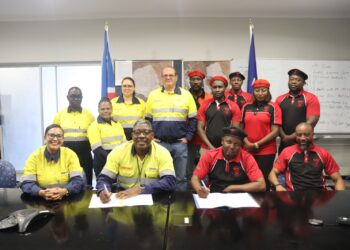
Empowerment Consulting Services Managing Partner Zenzi Awases says there is a need to establish a unified framework to govern the country’s oil and gas as well as critical metals sectors.
The proposal comes amid ongoing discussions regarding regulatory efficiency and sustainability in these industries.
Awases emphasised the need for a cohesive approach to managing the oil, gas and critical metals sectors, citing concerns over fragmented regulation and oversight.
According to Awases, the absence of a unified framework hampers efforts to address the complex interdependencies within these industries.
“Each sector currently operates under its own set of regulations, leading to inconsistencies and inefficiencies. To optimise sector potential and ensure sustainable development, a single framework that encompasses all aspects of exploration, extraction, and production is essential,” noted Awases.
She highlighted the importance of holistic governance and issues such as environmental impact and community engagement as interconnected challenges requiring comprehensive solutions.
Awases called for collaborative efforts among industry stakeholders, government entities, and civil society organisations to develop inclusive policies and standards.
The proposal aligns with global initiatives aimed at promoting responsible resource management and mitigating environmental risks associated with extractive industries.
Awases believes that a unified framework could enhance transparency and accountability, fostering greater trust among stakeholders.
University of Namibia lecturer Gurvy Kavei stressed the importance of strategic planning for the exploitation of critical minerals.
Kavei emphasised the need for clear strategies to ensure economic development and social progress.
He suggested reinvesting profits into initiatives such as building an endowment fund and increasing equity participation progressively.
Kavei also called for partnerships with educational institutions to build local capacity and advocated for policies that prioritise self-actualisation and value addition, particularly in infrastructure development.
Development Bank of Namibia CEO and Economist, John Steytler, emphasized Namibia’s favourable regulatory environment, particularly in the mineral sector, stating, “Namibia has always been highly rated when it comes to governance, protection of property rights, and policies.”
He cautioned against overregulation, emphasising the importance of maintaining a pragmatic approach towards economic development.
Steytler highlighted Namibia’s status as a mixed economy, allowing flexibility in decision-making, but warned against stifling investment with excessive regulation.
Regarding the mineral sector’s performance, Steytler noted, “Namibia was attracting investment in minerals,” attributing this success to the country’s strong regulatory framework.
He called for a deeper examination of how investments benefited Namibia and emphasised the country’s small, open economy status.
Steytler advocated for embracing openness and strategic positioning within regional value chains.
He reaffirmed confidence in Namibia’s economic policies, citing the influx of mining investments as evidence.
The economist emphasised the need to align policies with the Constitution’s principles of embracing openness to foster economic growth.










